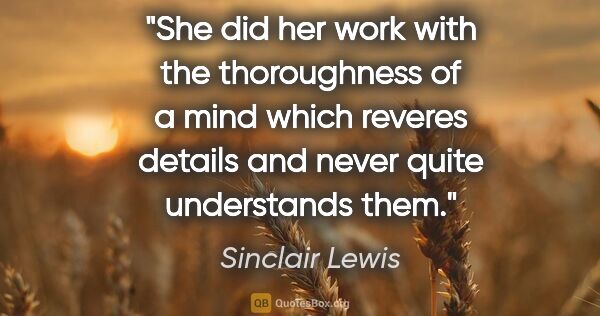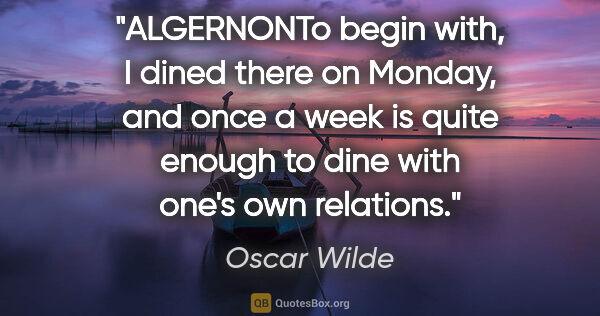Quite Quotes (page 93)
...though leaving him always to remark, portentously, on his probably having formed a relation, his probably enjoying a consciousness, unique in the experience of man. People enough, first and last, had been in terror of apparitions, but who had ever before so turned the tables and become himself, in the apparitional world, an incalculable terror? He might have found this sublime had he quite dared to think of it; but he didn't too much insist, truly, on that side of his privilege.
Henry James
That moment she was mine, mine, fair, Perfectly pure and good: I found. A thing to do, and all her hair. In one long yellow string I wound. Three times her little throat around, And strangled her. No pain felt she; I am quite sure she felt no pain. As a shut bud that holds a bee, I warily oped her lids: again. Laughed the blue eyes without a stain. And I untightened the next tress. About her neck; her cheek once more. Blushed bright beneath my burning kiss . . .
Robert Browning
Die Judenfrage,' it used to be called, even by Jews. 'The Jewish Question.' I find I quite like this interrogative formulation, since the question—as Gertrude Stein once famously if terminally put it—may be more absorbing than the answer. Of course one is flirting with calamity in phrasing things this way, as I learned in school when the Irish question was discussed by some masters as the Irish 'problem.' Again, the word 'solution' can be as neutral as the words 'question' or 'problem,' but...
Christopher Hitchens
The guest was now the master of Wuthering Heights: he held firm possession, and proved to the attorney, who, in his turn, proved it to Mr. Linton, that Earnshaw had mortaged every yard of land he owned for cash to supply his mania for gaming; and he, Heathcliff, was the mortgagee.In that manner, Hareton, who should now be the first gentleman in the neighbourhood, was reduced to a state of complete dependence on his father's inveterate enemy; and lives in his own house as a servant deprived of...
Emily Bronte

...but after reading a chapter or two a shadow seemed to lie across the page. It was a straight dark bar, a shadow shaped something like the letter 'I.' One began dodging this way and that to catch a glimpse of the landscape behind it. Whether that was indeed a tree or a woman walking I was not quite sure. Back one was always hailed to the letter 'I.
Virginia Woolf
And it was to this city, whenever I went home, that I always knew I must return, for it was mistress of one's wildest hopes, protector of one's deepest privacies. It was half insane with its noise, violence, and decay, but it gave one the tender security of fulfillment. On winter afternoons, from my office, there were sunsets across Manhattan when the smog itself shimmered and glowe? Despite its difficulties, which become more obvious all the time, one was constantly put to the test by this...
Willie Morris
Every single person is vulnerable to unexpected defeat in this inmost emotional self. At every moment, behind the most efficient seeming adult exterior, the whole world of the person's childhood is being carefully held like a glass of water bulging above the brim. And in fact, that child is the only real thing in them. It's their humanity, their real individuality, the one that can't understand why it was born and that knows it will have to die, in no matter how crowded a place, quite on its...
Ted Hughes
Good writing, and this is especially important in a subject such as economics, must also involve the reader in the matter at hand. It is not enough to explain. The images that are in the mind of the writer must be made to reappear in the mind of the reader, and it is the absence of this ability that causes much economic writing to be condemned, quite properly, as abstract.
John Kenneth Galbraith

The best remedy for those who are afraid, lonely or unhappy is to go outside, somewhere where they can be quite alone with the heavens, nature and God. Because only then does one feel that all is as it should be and that God wishes to see people happy, amidst the simple beauty of nature. As longs as this exists, and it certainly always will, I know that then there will always be comfort for every sorrow, whatever the circumstances may be. And I firmly believe that nature brings solace in...
Anne Frank
